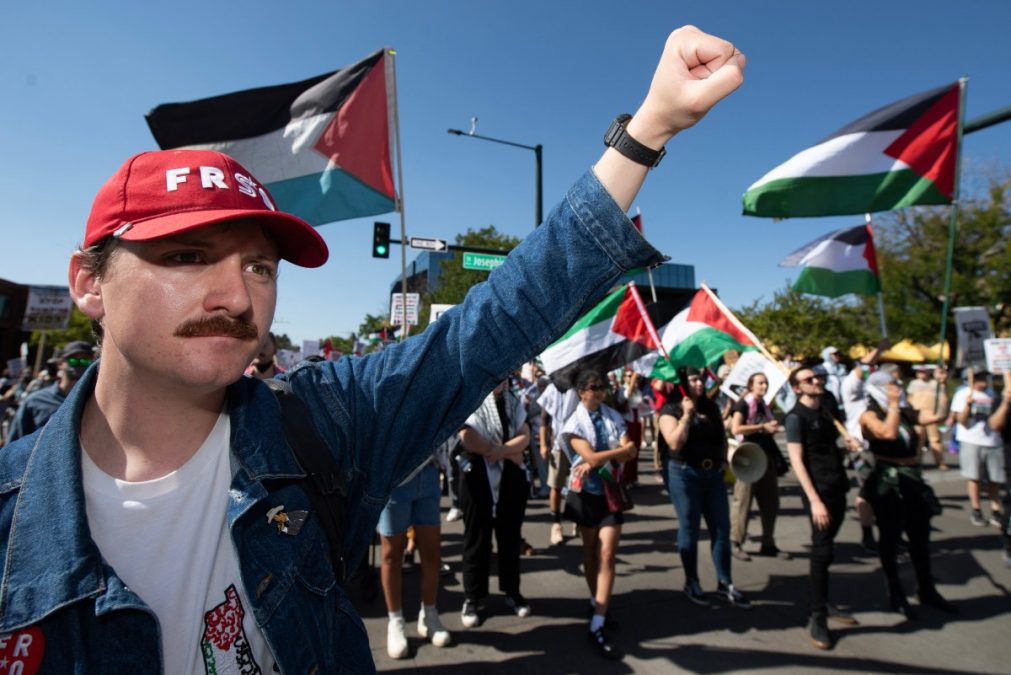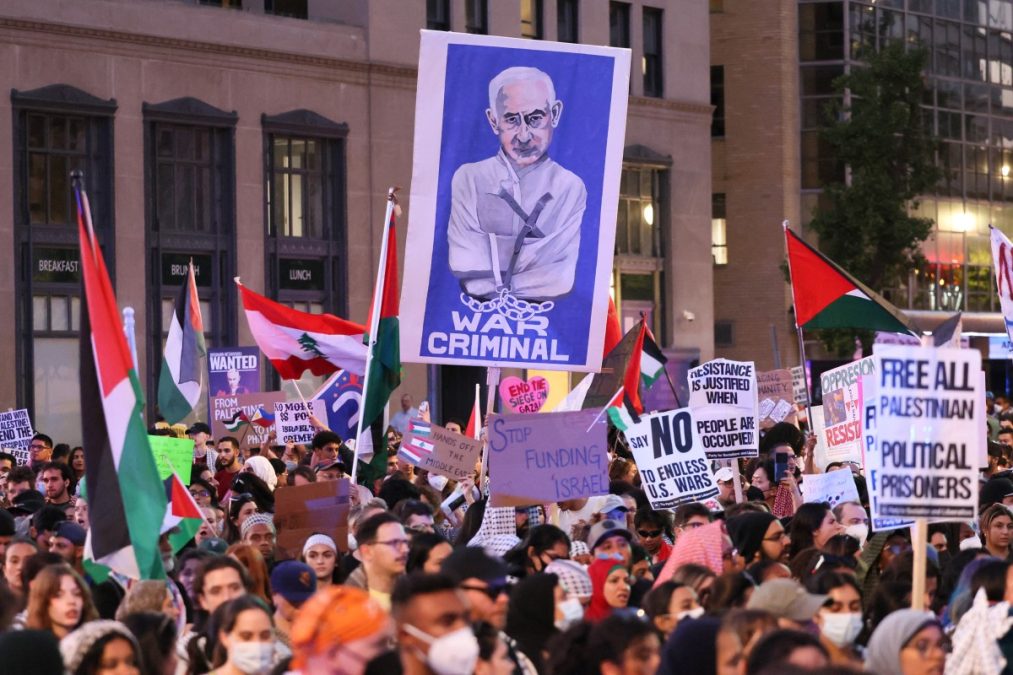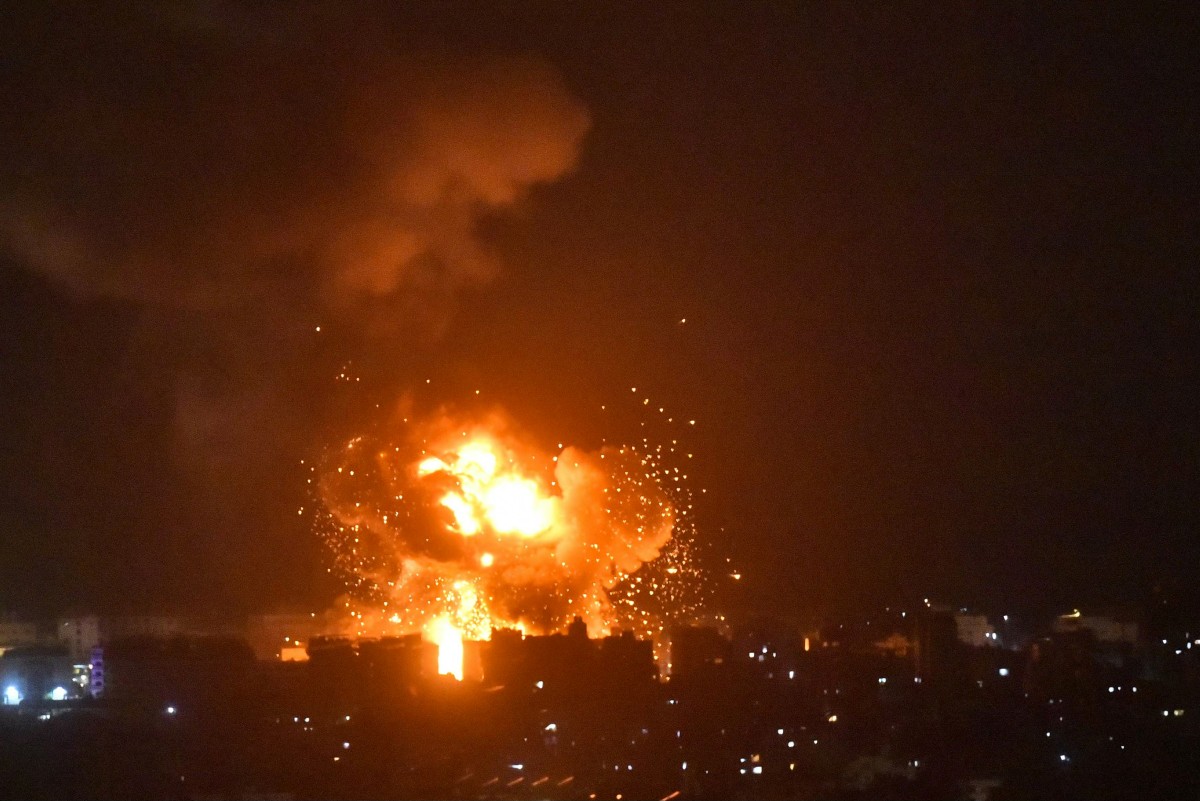Beirut, Lebanon – Official Lebanese media said Israeli strikes hit south Beirut Saturday night into Sunday, some of them “very violent”, with AFP correspondents hearing explosions for over two hours in one of the most intense barrages yet.
“Israeli enemy warplanes carried out four very violent strikes on (Beirut’s) southern suburbs, and one strike on the Chweifat” area, with ambulances rushing to the site, Lebanon’s National News Agency said.
AFP correspondents heard explosions in south Beirut and its outskirts for more than two hours following the NNA’s statement.
AFP footage showed plumes of smoke rising from the targeted areas.
In one south Beirut location a ball of flame rose into the air while flares shot up amid thick smoke for about an hour.
An AFP correspondent in the Sabra area close to Beirut’s southern suburbs saw dozens of people on the streets, some carrying bags fleeing on foot or on motorbikes as explosions echoed in the background.
The NNA said air traffic at Lebanon’s only airport in Beirut, close to the targeted areas, was “ongoing despite the Israeli enemy’s aggression on the southern suburbs. Several Middle East Airlines planes have just landed”.
The Israeli army said it was “currently striking terror targets belonging to the Hezbollah terrorist organization in the area of Beirut” in a statement on its Telegram channel.
Earlier Saturday night, the Israeli army announced a new call for residents to evacuate from Beirut’s southern suburbs, as it continued to target Hezbollah positions in the Lebanese capital.
“For your safety and that of your family members, you must immediately evacuate the designated buildings and those adjacent to them and move away from them at least 500 meters,” said spokesperson Avichay Adraee on social media, alongside satellite images highlighting areas in the Burj el-Barajneh, Haret Hreik and Chweifat al-Amrussiya neighbourhoods.
Lebanon’s Hezbollah movement and its foe Israel have been exchanging near-daily cross-border fire for nearly a year in fallout from the Gaza war.

But since September 23, Israel has launched devastating air strikes on targets in Lebanon that have killed more than 1,110 people and forced more than one million to flee their homes.
Last week, Israel killed Hezbollah leader Hassan Nasrallah in air strikes on the group’s south Beirut bastion.
UN chief calls for end to ‘shocking violence’
The UN secretary-general denounced Hamas and called for an immediate end to the “shocking violence and bloodshed” in Gaza and Lebanon in a statement Saturday ahead of the anniversary of the Palestinian group’s October 7 attack.
Monday marks one year since the devastating assault on Israel that sparked the ongoing war in Gaza, with Lebanon now also pulled into the fray and world leaders warning of a potential all-out regional crisis.
“This is a day for the global community to repeat in the loudest voice our utter condemnation of the abhorrent acts of Hamas, including the taking of hostages,” UN chief Antonio Guterres said in an anniversary message released Saturday evening.
While demanding the hostages’ “immediate and unconditional release,” Guterres also implored Hamas to allow the hostages to be visited by Red Cross personnel.
Hamas militants abducted 251 people on October 7, 97 of whom are still captive in Gaza, including 33 the Israeli military has said are dead.
Guterres additionally voiced concern over the conflict spreading to Lebanon, where Israel in recent days has pounded the Hamas-allied group Hezbollah, killing over a thousand people and forcing more than a million to flee their homes.
“The war that has followed the terrible attacks of one year ago continues to shatter lives and inflict profound human suffering for Palestinians in Gaza, and now the people of Lebanon,” Guterres said.
The October 7 attack on Israel resulted in the deaths of 1,205 people, mostly civilians, according to an AFP tally based on Israeli official figures that include hostages killed in captivity.

Israel’s retaliatory offensive on Gaza has so far killed at least 41,825 people, a majority of them civilians, according to the health ministry in the Hamas-run Palestinian territory. The UN has said those figures are reliable.
“Since October 7th, a wave of shocking violence and bloodshed has erupted,” said Guterres.
“It is time for the release of the hostages,” he said. “Time to silence the guns. Time to stop the suffering that has engulfed the region. Time for peace, international law and justice.”
Macron criticizes Israel on Gaza, Lebanon operations
French President Emmanuel Macron called Saturday for a halt on arms deliveries to Israel for use in Gaza, provoking a sharp response from Israeli Prime Minister Benjamin Netanyahu.
Macron also criticised Netanyahu’s decision to send troops into ground operations in Lebanon.
“I think that today, the priority is that we return to a political solution, that we stop delivering weapons to fight in Gaza,” Macron told French broadcaster France Inter.
“France is not delivering any,” he added during the interview, which was recorded Tuesday.
Macron reiterated his concern over the conflict in Gaza that is continuing despite repeated calls for a ceasefire.
“I think we are not being heard,” he said. “I think it is a mistake, including for the security of Israel,” he said, adding that the war was leading to “hatred”.
His comments brought a swift response from Netanyahu.
“As Israel fights the forces of barbarism led by Iran, all civilized countries should be standing firmly by Israel’s side,” Netanyahu said in a statement issued by his office.
“Yet, President Macron and other Western leaders are now calling for arms embargoes against Israel. Shame on them.”
Israel was fighting a war on several fronts against groups backed by arch-foe Iran, the statement added.
Macron’ office responded with a statement of its own later Saturday.
France is a “steadfast friend of Israel”, it said, describing Netanyahu’s reaction as “excessive and detached from the friendship between France and Israel”.
Qatar, a key mediator in Gaza ceasefire talks, said Macron’s statement was “an important and appreciated step towards stopping the war”.
Jordan welcomed the French leader’s remarks and stressed “the importance of imposing a complete ban on the export of weapons to Israel” and “real consequences” for the country’s actions.
In his interview, Macron also said avoiding an escalation in Lebanon was a “priority.”
“Lebanon cannot become a new Gaza,” he added.
And he returned to the subject Saturday in a speech to a conference of French-speaking nations in Paris.
While both Paris and Washington had called for a ceasefire, said Macron, “I regret that Prime Minister Netanyahu has made another choice, has taken this responsibility, in particular, for ground operations on Lebanese soil.”
The 88 members of the International Organisation of La Francophonie (OIF), including France and Canada, have called for an “immediate and lasting” ceasefire in Lebanon, he added.
But Macron reaffirmed Israel’s right to self-defence and said that on Monday he would be meeting relatives of Franco-Israelis held hostage in Gaza.
On Monday, Israel marks the first anniversary of the October 7 Hamas attack that sparked the Gaza war and has now engulfed neighbouring Lebanon, creating a perilous regional crisis.
The attack resulted in the deaths of 1,205 people, mostly civilians, according to an AFP tally based on Israeli official figures that include hostages killed in captivity.
Israel’s retaliatory offensive on Gaza has so far killed at least 41,825 people, a majority of them civilians, according to the health ministry in the Hamas-run Palestinian territory. The UN has said those figures are reliable.








